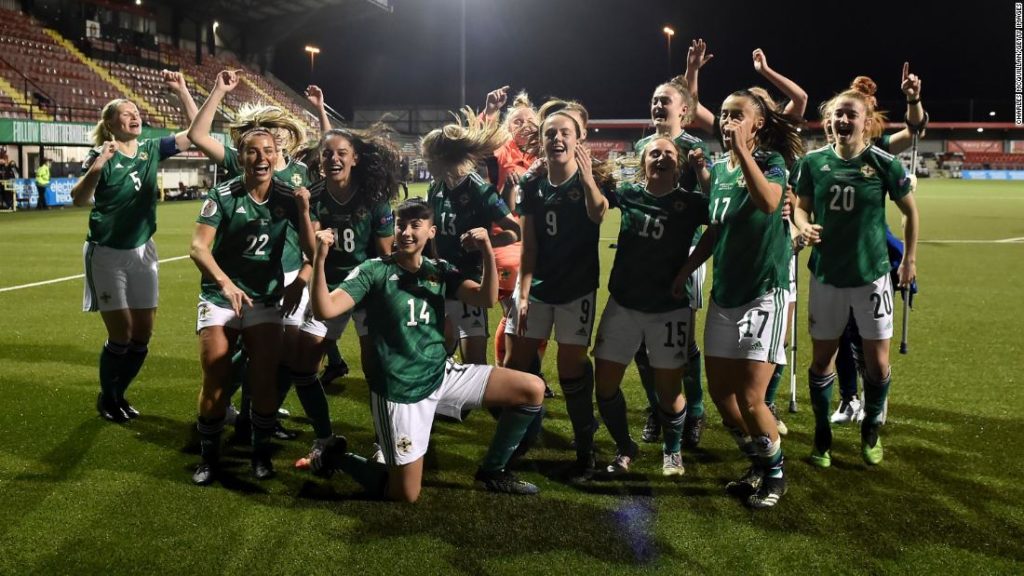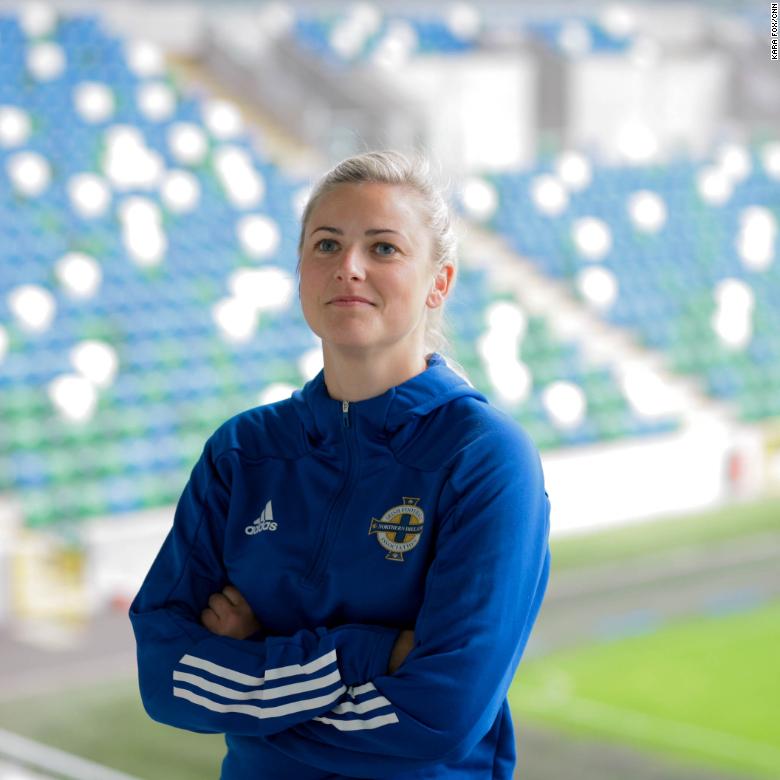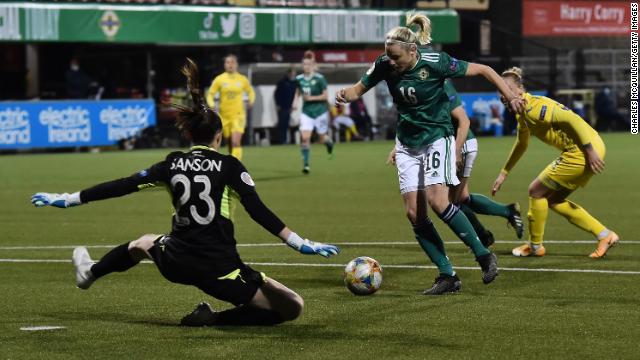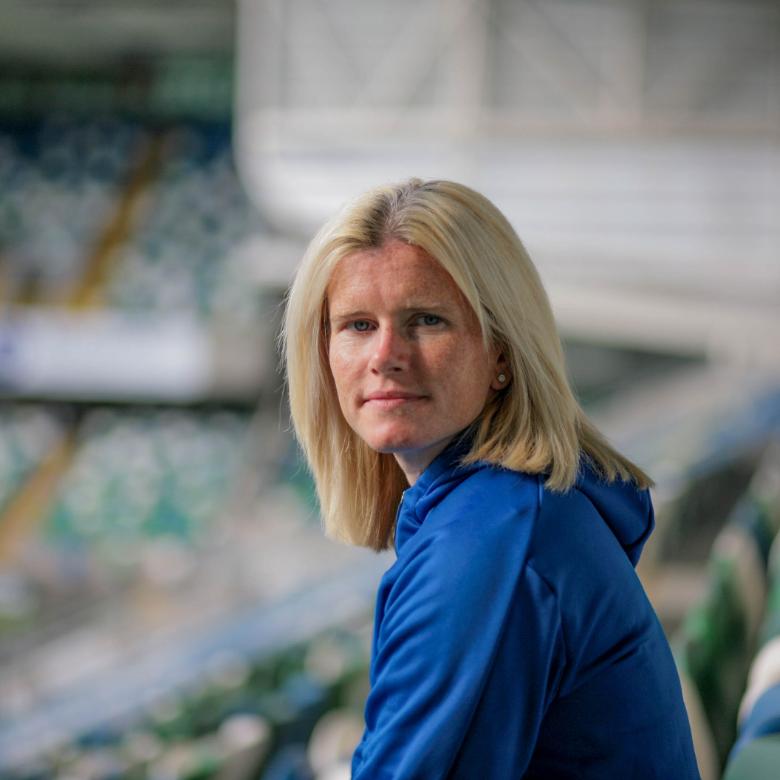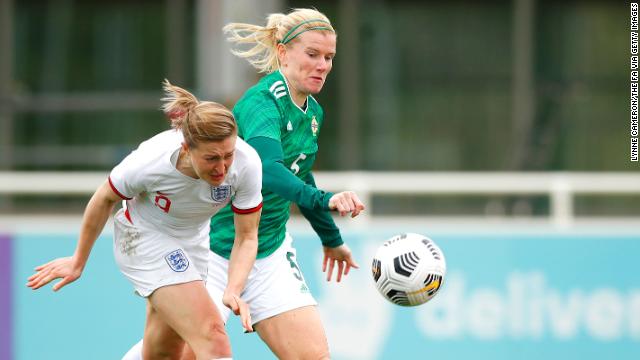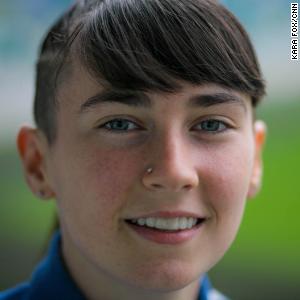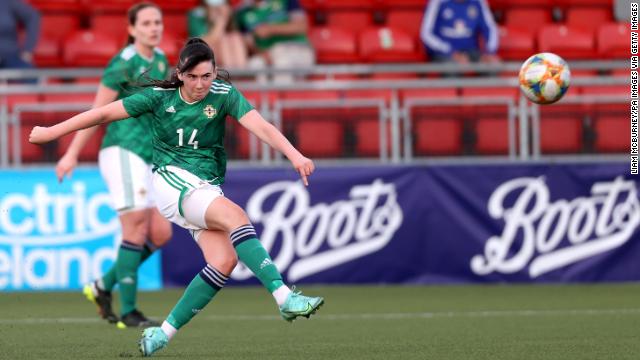Life has changed for the midfielder since scoring the winning goal that catapulted her side to their first major tournament — the upcoming Women’s Euro 2022.
It’s an incredible achievement for the Northern Ireland team, who, hampered by a round of injuries to key players, also couldn’t play together due to Covid restrictions but once in February for a friendly match against England.
And even more incredibly, many of the players are balancing full-time work off the pitch.
Caldwell, 30, is one of them, juggling shifts at one of Belfast’s busiest hospitals with training and matches. Football is her release from the upheaval that the pandemic has caused.
“It (football) always takes front and center — and a job comes second.” But Caldwell, like most in her industry, is hopeful for a future in football where that is the only job.
However, that remains a dream for many women athletes in Northern Ireland.
“If you want to play full time, you really are pushed across the water,” Caldwell, who played for an Australian club from 2015-2017, said. Playing abroad can serve as a springboard to a professional career, but she would like it to see it happen at home.
“A lot of people do have aspirations to go across the water… obviously, we’d love to play in the (English) Super League — but if it got better here, then you would prefer to stay at home and play with your circumstances right now.”
“How can we improve the financial side and the league so that we can keep players at home and strengthen the league?” Caldwell added.
The lives of sportsmen compared to women in the game differs greatly, with opportunities for female players to make a living wage still lagging far behind men.
Meanwhile, some 55% of male players globally earned more than US $1,000, according to FIFPRO’s Men’s 2016 Global Employment report — the latest comparative survey from FIFPRO.
The 2017 report on female athletes — which surveyed nearly 3,600 players in Europe, Africa, Asia and the Americas — found that 46% of players combine their football career with study, while 30% combine their football careers with another job. Meanwhile, 47% of female players globally have no employment contract.
And for those getting paid, their salaries are dwarfed by the men’s earnings.
Women playing in England’s Super League, the country’s top tier, earned an average of $35,355 a year, according to the 2017 Global Sports Salaries (GSSS) report.
The average salary in the top men’s football competition in England, the Premier League, meanwhile, averaged $3.43 million a year — or 99 times as much as the women’s earnings, it said.
The average Premier League player’s salary has risen to $3.97 million, according to latest GSSS report from 2019, which does not include an update on women’s salaries.
Julie Nelson, a veteran defender who was recently awarded the British Empire Medal (BEM) by Queen Elizabeth for her services to women’s football, says that women’s clubs need to be protected from losing talent.
“There’s nothing to tie you to a club here,” Nelson said to CNN Sport, noting that the Northern Ireland Glentoran club received nothing when a star player was signed to Scottish giant Rangers.
“Those types of things need to be brought in for clubs here so that if players do get picked up from a club across the water, then there’s a financial gain — which is what happens in the men’s game.”
A balancing act
“It can be difficult at times, obviously, to fit it all in. Sometimes, you just feel like you’re constantly running on empty, you’re just bouncing almost from one thing to another.”
Along with contracts, medical cover should be addressed as well, Nelson added.
At Glentoran, where Caldwell plays, the club has held fundraisers for players’ surgeries not covered outside of the basic physio provided — plus, there’s no maternity cover.
“If somebody goes and has a baby, you might not return,” Caldwell said.
The 2017 FIFPRO report found that hundreds of footballers are leaving the game in their 20s before reaching their full potential, with the majority of players (69%) between 18 and 23.
An overwhelming majority of those surveyed, some 90%, said they might quit football prematurely, with 90% considering ending their career earlier to find a better-paid job or to start a family, among other reasons.
Since the report’s release, there have been positive changes in the women’s game, including in Ireland, Australia, the Netherlands, Argentina, Spain and Italy.
Some Northern Ireland players raised some of these financial concerns in 2018, saying that it was costing them to play in international matches and that their requests for adequate pay to cover playing expenses hadn’t been addressed.
“This results in players withdrawing and a lack of consistency in squads which in turn is undermining the ability of the team to qualify for major tournaments,” he said.
The women’s team are now remunerated for international games, according to Danny Lynch, the IFA’s head of communications.
And Caldwell said she’s seen improvements since she returned from playing in Australia, saying that “there is support there” now.
“I think they’re (IFA) doing as much as they can at the minute. But obviously, we would like to see it push on and maybe move a bit quicker,” she added.
Nelson agrees, saying that women’s football has “changed massively” in her lifetime. When she was first starting to play at age five, there was “nowhere that you would have seen women playing — and there were no local teams where I lived.”
Now, young girls are able to chase their dreams of becoming professional footballers, with elevated support and exposure.
While she says it’s kind of “cringey,” Caldwell acknowledges that their team’s success has made them role models and is trying to lead by example.
“The more of us that are better role models and that can be a role model for the younger ones coming through, the better. It’s cliché, but it is true,” she said.
Pride and focus
Both Caldwell and Nelson say they have plans to coach after their playing careers, hoping to bring positive change to their sport. Experts say that elevating former athletes, who can harness experience and authority, to leadership roles is a key step to equity in sport.
The men’s senior team agreed to a cut for their international fees, with the FAI agreeing to match that contribution with a rise in fees paid out to the women.
“Look at what we’ve done in qualifying for such a major tournament, like, as amateur players — compared to Scotland and Wales who didn’t even qualify when there are full-time players,” Finnegan said.
“And then imagine what would happen if all our players here were full time and just focusing on football every single day? Imagine… how good it would be?”
Northern Ireland Women kicked off their qualification campaign for the World Cup with a double-header at home this week, first taking on Luxembourg at Inver Park on Friday where they won 4-0. They’ll host Latvia on September 21 at The National Football Stadium at Windsor Park.
You may also like
-
Super League: UEFA forced to drop disciplinary proceedings against remaining clubs
-
Simone Biles says she ‘should have quit way before Tokyo’
-
Kyrie Irving: NBA star the latest to withhold vaccination status
-
Roger Hunt: English football mourns death of Liverpool striker and World Cup winner
-
‘Every single time I lift the bar, I’m just lifting my country up’: Shiva Karout’s quest for powerlifting glory

